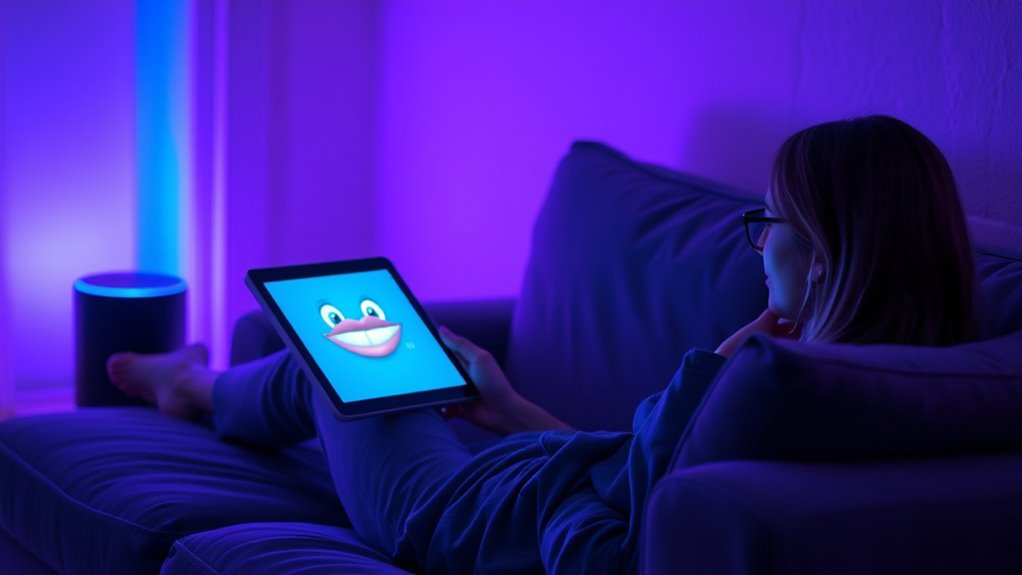If your partner uses AI chatbots or virtual companions to fulfill emotional needs, it might cause concern, especially if it affects your relationship’s intimacy or trust. These digital connections can feel convincing but lack genuine feelings, which could lead to dependency or neglect of real-world bonds. While they offer comfort and support, they shouldn’t replace meaningful human interaction. Want to understand how to navigate these digital boundaries? Keep going to find out more.
Key Takeaways
- AI chatbots offer personalized, emotionally supportive interactions that may lead to dependence, potentially impacting real-world relationships.
- Relying on virtual companions for emotional needs could cause neglect of human connections and intimacy.
- The artificial nature of AI bonds raises concerns about authenticity and emotional deception in relationships.
- Privacy risks exist if users share sensitive information with AI, affecting trust and security.
- Open communication and boundary awareness are essential to ensure AI companionship complements rather than replaces real partnerships.

AI chatbots and virtual companions are transforming the way you interact with technology by providing personalized, conversational experiences. These digital entities are designed to understand your preferences, respond in ways that feel natural, and even simulate emotional connections. As a user, you might find yourself chatting for hours, sharing your thoughts, or seeking comfort from an AI that’s always available. This level of interaction blurs the lines between technology and human connection, creating a sense of companionship that can feel surprisingly genuine.
AI chatbots and virtual companions offer personalized, natural interactions that blur the line between technology and genuine human connection.
For many, these virtual companions offer a safe space to explore feelings or vent frustrations without judgment. They can provide encouragement, remind you of important tasks, or simply keep you company during lonely moments. Unlike human relationships, AI chatbots are always accessible, never tired, and free from the complexities of human emotions, which can be both comforting and unsettling. You may begin to rely on these digital partners to fill gaps in your social life or emotional needs, leading to questions about how they affect your real-world relationships.
While some see AI companions as harmless tools that enhance your well-being, others worry about the potential for emotional dependency. It’s easy to become accustomed to the consistent presence and understanding of these virtual entities, especially if your offline interactions are limited or challenging. This reliance can sometimes lead to neglecting real-world relationships or emotional growth, as you might prefer the predictable, non-judgmental responses of an AI over the unpredictability of human interactions. Additionally, the predictability of AI responses can make it challenging to navigate complex emotional situations with genuine human empathy. Moreover, as these technologies evolve, they can sometimes simulate genuine emotional understanding, which may further blur the boundaries between authentic and artificial connection.
Furthermore, there’s an ongoing debate about authenticity. AI companions can mimic empathy and understanding convincingly, but they lack genuine feelings or consciousness. When you develop emotional bonds with these digital entities, it raises questions about the nature of love and companionship. Are they truly substitutes, or just sophisticated simulations? This ambiguity can be both intriguing and unsettling, especially if you start prioritizing your interactions with AI over real people. Researchers emphasize the importance of maintaining healthy boundaries to ensure these digital relationships don’t interfere with your real-world connections.
Your concern as a user might also extend to privacy and data security. These virtual companions learn from your conversations to improve their responses, but that means sharing intimate details. If not properly safeguarded, your personal information could be vulnerable. As a result, it’s essential to think about how much emotional investment you’re willing to make and to remain aware of the boundaries between digital comfort and real-world connections. Ultimately, AI chatbots and virtual companions are tools—powerful ones—that can enrich your life, but they should complement, not replace, authentic human relationships. Recognizing the importance of digital interactions and maintaining a healthy balance is crucial for your overall well-being. Furthermore, understanding the privacy implications involved can help you make informed decisions about your participation with these virtual entities.
Frequently Asked Questions
Can AI Chatbots Truly Replace Human Emotional Connections?
You wonder if AI chatbots can truly replace human emotional connections. While they can mimic empathy and provide companionship, they lack genuine understanding and shared experiences that form deep bonds. You might feel comfort from their responses, but real emotions, vulnerability, and unpredictability only come from human interactions. So, AI can supplement your social needs but can’t fully substitute the richness of authentic human relationships.
How Secure Is Personal Data Shared With Virtual Companions?
You wonder how secure your personal data is when sharing with virtual companions. The truth is, your data’s security depends on the platform’s privacy policies, encryption practices, and data management. You should scrutinize these policies, question the company’s transparency, and stay updated on security measures. Protect yourself by avoiding sharing overly sensitive info, using strong passwords, and choosing trusted services that prioritize your privacy and data security.
Will AI Companions Develop Genuine Consciousness Someday?
You wonder if AI companions will ever develop genuine consciousness. Right now, AI operates based on algorithms and data, lacking true self-awareness or emotions. While future advancements might make AI seem more human, experts believe consciousness involves subjective experience that machines can’t replicate. So, it’s unlikely AI will truly become conscious anytime soon. You should stay aware that AI remains a sophisticated simulation, not a conscious being.
Are There Legal Implications for Relationships With AI Chatbots?
When considering the legal implications of relationships with AI chatbots, you need to remember that laws haven’t fully caught up with technology yet. You might face questions around consent, ownership, or emotional harm. As AI evolves, regulations could change, so it’s wise to stay informed. Currently, these relationships are mostly unregulated, but future legal frameworks could impact your rights and responsibilities, making it important to understand potential legal risks.
How Do AI Virtual Partners Impact Mental Health?
You might think AI virtual partners could boost your mental health by providing companionship and reducing loneliness. While they can offer comfort and support, over-reliance might lead to social isolation or unrealistic expectations. Research shows some users find relief, but others risk emotional dependence. It’s essential to balance virtual interactions with real-life connections, ensuring AI complements your well-being without replacing genuine relationships.
Conclusion
As you navigate this digital landscape, remember that AI chatbots and virtual companions are like mirrors reflecting your desires, not replacing the warmth of real human connection. While they can comfort and entertain, they can’t replicate the messy beauty of genuine relationships. Keep your heart open to authentic bonds—they’re the anchor in a sea of virtual illusions. After all, no matter how advanced technology gets, true love remains a human masterpiece waiting to be painted.









